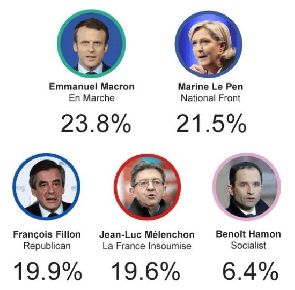The euro jumped to a five-month high after the first round of voting in the French presidential election on Sunday.
Centrist Emmanuel Macron topped the voting, going through to the final round with far-right Marine Le Pen.
Investors had worried that far-left Jean-Luc Mélenchon would beat Mr Macron, giving voters a choice between two Eurosceptic candidates.
At one point, the euro hit its highest level since mid-November, and France’s Cac 40 share index jumped 4%.
In London, the FTSE 100 share index rose 1.5%.
Octavio Marenzi, chief executive of the financial research consultancy Opimas in Paris, said: “Macron will be reassuring to markets, with his pledge to lower corporate taxes and to lighten the administrative burden on firms. He basically represents continuity.”
Other analysts said markets had welcomed Mr Macron’s first-round win and his large lead in opinion polls over Ms Le Pen, who has opposed the euro and France’s EU membership.
“Clearly investors are happy with the result as a ‘Frexit’ seems to be off the table,” said Neil Wilson, an analyst at ETX Capital in London.
“But watch for the risks to return – if Le Pen starts polling in the 40%+ bracket we will see nerves creep back in and some of these big lurches higher could be dialled back as profits are taken and investor reprice risk.”
European bank shares rose to their highest level since December 2015 on the improved prospects for the euro.
In France, shares in Societe Generale jumped nearly 10% and Credit Agricole was up more than 8%. In London, Barclays rose 5% and RBS added 2.5%.
As results started coming in on Sunday night, the euro jumped 2% against the dollar to $1.09395, its highest level since 10 November, the day after the results of the US presidential election. It later fell back to $1.0850.
Against sterling, the euro was 1.1% higher at 0.8470 pence.
“The extent of the market reaction shows how nervous investors were, worried that the actual polls would deliver another shock result,” said Steven Bell, chief economist at BMO Global Asset Management.
Rallying around Macron
Mr Macron, a former investment banker, served as economy minister under current President Francois Hollande.
Despite his relative inexperience – he has never served as an MP – polls see him defeating Ms Le Pen in the second round.
Graphic showing final first-round results: Macron at 23.8%, Le Pen at 21.5%, Fillon at 19.9%, Melechon at 19.6% and Hamon at 6.4%
Richard McGuire, head of rates at Rabobank, said: “The assumption now is that centrist voters will rally around Macron, denying Le Pen the presidency and hence this will effectively be a pro-establishment, pro-European result.”
Mr Macron’s defeated rival in Sunday’s election, François Fillon, has already endorsed him. Other senior political figures in France, including former Prime
Minister Alain Juppe, have also thrown their weight behind Mr Macron.
However, Mr McGuire cautioned that, after the UK Brexit vote and the election of Donald Trump in the US, no one should take anything for granted ahead of the second round on 7 May.
Pro-European Mr Macron was the Socialist finance minister until the autumn, when he quit to set up the En Marche movement, which proposes tax and spending cuts.
The anti-EU Ms Le Pen’s campaign focused on jobs, security and the threat from Islamic extremism.
Bookmakers made Mr Macron the firm favourite to win the run-off, with both Ladbrokes and Coral offering 1-6 and William Hill 1-8, with Ms Le Pen at 4-1, 7-2 and 9-2 respectively.








